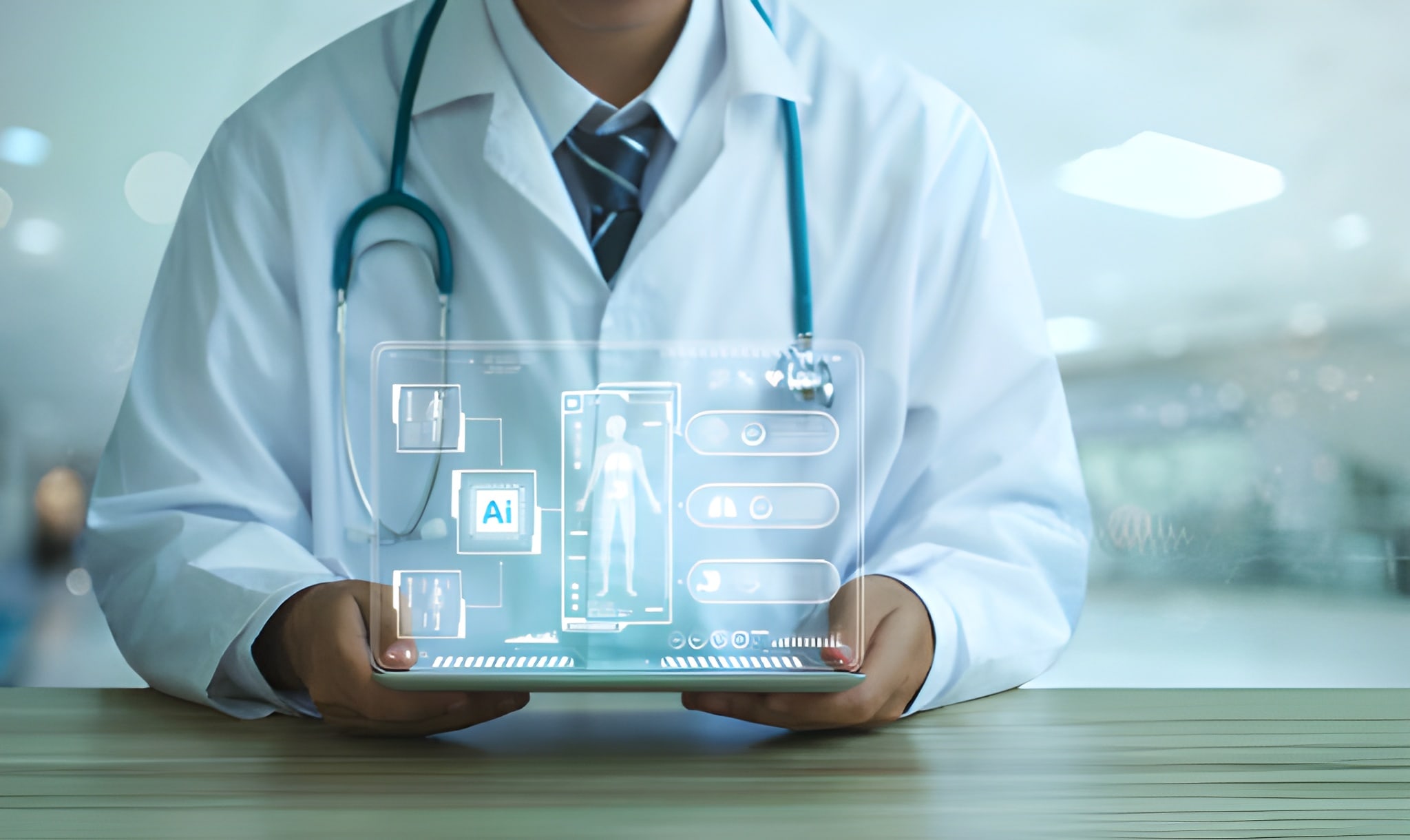TL;DR
This article explores the transformative impact of artificial intelligence in healthcare, detailing a major shift from reactive to proactive patient care. It explains that AI is no longer a futuristic concept but a practical tool for improving outcomes and efficiency. The guide covers several key AI in healthcare use cases, including the revolutionary role of AI in medical diagnosis, where it helps detect diseases earlier and with greater accuracy. It also examines how predictive analytics in healthcare is used to forecast disease outbreaks and optimise hospital operations.
The healthcare industry is undergoing a once-in-a-generation transformation. The traditional care model is being replaced by a predictive and personalized approach, and artificial intelligence ia at the core of this change. For healthcare leaders, a strategic understanding of AI in healthcare use cases is no longer optional; it’s the foundation for building a more efficient, effective, and patient-centric organization for the future.
The Shift from Reactive to Proactive Healthcare
For a long time, healthcare was mainly reactive; we used to take care of patients only after the onset of their diseases. Now, AI has shifted this paradigm. AI models being trained on huge piles of data can pinpoint at-risk patients, foresee the development of diseases, and advise on preventive measures even before the symptoms are too strong. The global AI in healthcare market is expected to increase in size greatly, which is a clear sign of its acknowledged worth and effect. This preventive method, underpinned by predictive analytics in healthcare, results not only in superior patient outcomes but also in considerable cost savings in healthcare over a long period of time.
Key AI in Healthcare Use Cases
The applications of AI are vast and are touching every corner of the healthcare ecosystem. Here are some of the most impactful AI in healthcare use cases today.
Revolutionizing Medical Diagnosis
This is one of the most powerful areas of AI in medical diagnosis. Machine learning algorithms, particularly deep learning models, can be trained to analyze medical images like X-rays, MRIs, and CT scans. These models can detect subtle patterns that may be invisible to the human eye, helping radiologists and pathologists identify diseases like cancer at their earliest, most treatable stages. This doesn’t replace doctors; it augments their expertise, acting as a powerful second opinion to improve accuracy and speed.
Accelerating Drug Discovery and Clinical Trials
Bringing a new drug to market is an incredibly long and expensive process. The usage of AI can accelerating this timeline. Machine learning models can analyze complex biological data to identify potential drug candidates and predict their effectiveness, saving years of initial research. Furthermore, AI can optimize the design of clinical trials by identifying the most suitable patient cohorts, which can lead to faster and more conclusive results.
Optimizing Hospital Operations
Hospitals are complex logistical operations. AI can be used to streamline these processes for massive efficiency gains. For example, AI models can predict patient admission rates, allowing hospitals to optimize bed allocation and staff scheduling. This form of predictive analytics in healthcare helps reduce wait times, improve patient flow, and lower operational costs. Administrative tasks can also be streamlined through expert NLP Development, which can process clinical notes and automate billing codes.
Enhancing Virtual Care with AI in Telemedicine
The rise of telehealth has opened new doors for patient care, and AI in telemedicine is making these services even more effective. Intelligent chatbots, created through expert AI Chatbots Development, can act as the first point of contact, triaging patients by asking initial screening questions before connecting them to a doctor. This ensures that physicians’ time is used most effectively. Moreover, AI can help monitor patients remotely by analyzing data from wearable devices, alerting care teams to any potential issues. A robust Mobile App Development strategy is key to delivering these services.
The Rise of AI Healthcare Startups
The immense potential of AI has fueled a boom in AI healthcare startups. These companies are often at the forefront of innovation, developing niche solutions for specific problems, from AI-powered mental health support to advanced genomic analysis. For established healthcare organizations, partnering with or learning from these startups can be a powerful way to accelerate their own digital transformation journey.
Our AI in Healthcare Services in Action: Case Studies
Case Study 1: An AI-Powered Diagnostic Tool
- The Challenge: A leading medical imaging center wanted to improve the accuracy and speed of its diagnostic process for a specific type of cancer. Radiologists were overwhelmed by the volume of scans.
- Our Solution: We developed a custom AI in medical diagnosis tool. The deep learning model was trained on thousands of anonymized medical images to identify and flag suspicious anomalies. It was integrated directly into the radiologists’ existing workflow as an assistive tool.
- The Result: The tool helped radiologists detect the cancer 20% earlier than with manual review alone and reduced the time spent per scan by 30%. This allowed them to increase their capacity and improve patient outcomes significantly.
Case Study 2: A Predictive Model for Hospital Readmissions
- The Challenge: A large hospital was struggling with a high rate of patient readmissions, which was costly and indicated gaps in post-discharge care.
- Our Solution: We provided our Predictive Analytics AI services to build a model that could identify patients at high risk of readmission. The model analyzed dozens of variables from the patient’s electronic health record to generate a risk score upon discharge.
- The Result: High-risk patients were automatically enrolled in a proactive follow-up program. The hospital reduced its 30-day readmission rate by 18%, saving millions in penalties and, more importantly, providing better care for its patients.
Our Technology Stack for Healthcare AI
We use a secure, scalable, and compliant stack for building healthcare solutions.
- AI & Machine Learning: TensorFlow, PyTorch, Scikit-learn, MONAI
- Cloud Platforms: AWS Healthcare, Google Cloud for Healthcare, Microsoft Azure for Health
- Data Standards: FHIR, DICOM, HL7
- MLOps: Kubeflow, MLflow
- Data Privacy & Security: HIPAA-compliant architectures, de-identification tools
Conclusion
The dynamics of AI in healthcare use cases is vast and growing, marking a significant shift towards a more intelligent, proactive, and personalized standard of care. From enhancing AI in medical diagnosis to streamlining hospital operations, the potential to improve patient outcomes and create efficiencies is immense. However, realizing this potential demands a strategic vision and a partner with deep expertise.
Ready to transform your healthcare approach? At Wildnet Edge, our AI-first approach to Custom Healthcare Software Development enables us to build solutions that are not only innovative but also secure, compliant, and tailored to your specific needs. Connect with us today to start building a healthier future.
FAQs
The ROI is multifaceted. It includes significant operational cost savings from optimized workflows and reduced readmissions, but the most important return is the improvement in patient outcomes. Better diagnostics and personalized care lead to a healthier population and a stronger brand reputation for the provider.
Data security is the highest priority. It involves using HIPAA-compliant cloud infrastructure, implementing end-to-end data encryption, and employing strict access controls. A robust governance framework is a non-negotiable part of any AI project in healthcare.
No. The goal of AI in healthcare is to augment, not replace, human expertise. AI is a powerful tool that can handle data analysis and pattern recognition at a scale humans cannot, freeing up doctors and nurses to focus on the critical tasks of patient care, empathy, and complex decision-making.
One of the biggest challenges is integration with existing legacy systems, like Electronic Health Records (EHRs). A successful implementation requires a clear integration strategy to ensure that new AI tools can seamlessly access data and fit into the existing clinical workflow.
Many AI healthcare startups are focusing on niche problems and using cloud-based AI platforms to build their solutions cost-effectively. Smaller clinics can often partner with these startups or use off-the-shelf AI tools to gain benefits without needing a massive in-house data science team.
Predictive analytics in healthcare is a specific application of AI. AI is the broader field of creating intelligent systems, while predictive analytics uses AI techniques (like machine learning) to analyze current and historical data to make predictions about future events, such as forecasting disease outbreaks.
The best approach is to start with a well-defined problem that has a clear potential for impact. A great first project often involves analyzing a specific, high-quality dataset you already have to solve a known inefficiency. This allows you to demonstrate value quickly and build momentum for more ambitious AI in healthcare use cases.

Managing Director (MD) Nitin Agarwal is a veteran in custom software development. He is fascinated by how software can turn ideas into real-world solutions. With extensive experience designing scalable and efficient systems, he focuses on creating software that delivers tangible results. Nitin enjoys exploring emerging technologies, taking on challenging projects, and mentoring teams to bring ideas to life. He believes that good software is not just about code; it’s about understanding problems and creating value for users. For him, great software combines thoughtful design, clever engineering, and a clear understanding of the problems it’s meant to solve.
 sales@wildnetedge.com
sales@wildnetedge.com +1 (212) 901 8616
+1 (212) 901 8616 +1 (437) 225-7733
+1 (437) 225-7733
















 AI Development Services
AI Development Services Industry AI Solutions
Industry AI Solutions AI Consulting & Research
AI Consulting & Research Automation & Intelligence
Automation & Intelligence













